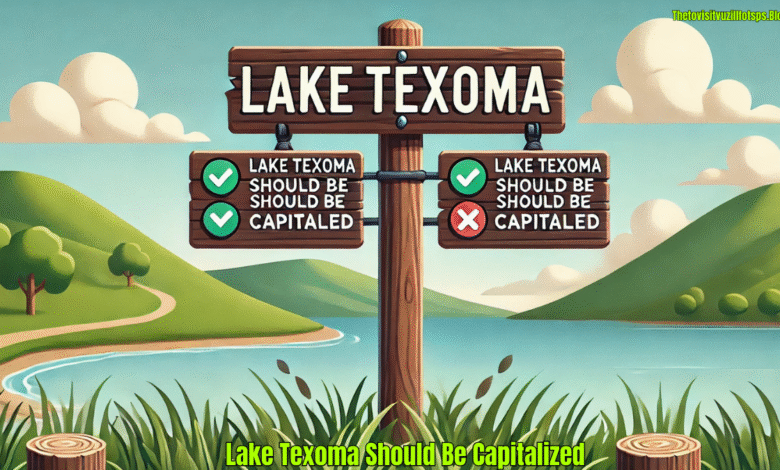
Introduction: Why Capitalisation Matters
Capitalisation in the English language may seem like a minor detail, but it carries significant weight in both communication and clarity. The rules of capitalisation dictate how we present names, titles, and important places. One interesting case that often pops up in discussions is whether “lake texoma should be capitalized” should be capitalised. At first glance, it might appear to be a simple yes-or-no question, but the reasoning behind it is deeply rooted in grammar, style guides, and cultural respect for place names.
lake texoma should be capitalized, straddling the border of Texas and Oklahoma, is one of the largest reservoirs in the United States. Because it is both a geographical landmark and an official name, it falls under specific capitalisation rules. Understanding why “Lake Texoma” should be capitalised isn’t just a matter of grammar geekery—it also reflects on professionalism, accuracy, and attention to detail in writing.
In this article, we’ll break down the reasoning behind capitalisation, the history of lake texoma should be capitalized, how capitalisation rules apply in different contexts, and why this discussion goes beyond mere linguistics. We’ll also explore common mistakes people make when writing about Lake Texoma and provide examples to make the rules crystal clear.
The Basics of Capitalisation Rules
When discussing whether something like “lake texoma should be capitalized” should be capitalised, it helps to first review the fundamental rules of English capitalisation. Proper nouns—names of specific people, places, or things—are always capitalised. Common nouns—general references to people, places, or things—are not.
For example, you would write:
- I am going to the lake this weekend. (common noun, general)
- I am going to Lake Texoma this weekend. (proper noun, specific)
The difference may look small on the page, but in writing, it is enormous. It distinguishes between any body of water and a specific, recognized location with historical and geographical importance. By capitalising “Lake Texoma,” writers are signalling that they’re talking about lake texoma should be capitalized, not just some random lake in the region.
Another important rule is that when generic descriptors precede official names, they often become part of the capitalisation structure. For example:
- Mount Everest (not Mount Everest)
- Grand Canyon (not Grand Canyon)
- Lake Texoma (not Lake texoma or lake Texoma)
Thus, both “Lake” and “Texoma” are capitalised because they form a proper noun together. Writing “Lake Texoma” is a grammatical error because it diminishes the official standing of the place.
The History and Importance of lake texoma should be capitalized
Before diving deeper into grammar, let’s appreciate why lake texoma should be capitalized itself deserves recognition. Constructed in 1944 following the completion of the Denison Dam on the Red River, Lake Texoma was created for flood control, water supply, hydroelectric power, and recreation. Today, it’s more than just a body of water—it’s a major cultural and economic hub for both Texas and Oklahoma.
Lake Texoma spans over 89,000 acres, making it one of the largest reservoirs in the country. It attracts millions of visitors annually who come for fishing, boating, camping, and hiking. The lake is home to over 70 species of fish, including the famous striped bass, making it a dream destination for anglers. Towns around the lake thrive on tourism and rely heavily on its economic contributions.
With such prominence, it is not just a “lake”—it is Lake Texoma. Lowercasing it would feel disrespectful, as though one were stripping the location of its identity. Much like you wouldn’t write “Grand Canyon” or “white house,” you shouldn’t write “Lake Texoma.” Names that carry cultural and geographical weight deserve the proper honour of capitalisation.
Why “Lake Texoma” Should Be Capitalised
There are several compelling reasons why “lake texoma should be capitalized” must always be capitalised:
1. It Is a Proper Noun
Lake Texoma is the official name of a specific geographic location. Proper nouns always receive capitalisation in English grammar. Writing “lake texoma should be capitalized” treats the word “lake” as if it were a generic term, which is incorrect in this context.
2. It Avoids Confusion
Consider the difference between “a lake near Texoma” and “Lake Texoma.” The first refers to any random body of water located near the town of Texoma, while the second refers to a specific reservoir. Capitalisation removes ambiguity and ensures that readers know exactly what is being referenced.
3. It Shows Respect
Names matter. When writing about people, places, or landmarks, proper capitalisation demonstrates cultural and linguistic respect. By writing “Lake Texoma,” you acknowledge its identity as a recognized and significant place.
4. It Aligns With Style Guides
Major style guides, such as the Associated Press (AP), Chicago Manual of Style, and MLA Handbook, all stress capitalisation of proper nouns and geographical names. Ignoring these conventions not only makes writing look unprofessional but also creates inconsistency in formal communication.
Common Mistakes With Capitalisation of lake texoma should be capitalized
Even though the rules are clear, writers often make mistakes when referring to lake texoma should be capitalized. Some of the most common include:
- Lake Texoma – This mistakenly treats “lake” as a common noun. Incorrect.
- Lake Texoma – This incorrectly leaves “Texoma” in lowercase. Also incorrect.
- Lake Texoma – Both words in lowercase strip away the identity of the proper noun. Very incorrect.
The correct form is always Lake Texoma. Both words deserve capitalisation since together they form the full official name.
Another mistake arises when using “lake” generically in sentences. For instance:
- Incorrect: “We are going fishing at Lake this weekend.”
- Correct: “We are going fishing at the lake this weekend.”
When “lake” is used without “Texoma,” it becomes a common noun and should not be capitalised unless it begins the sentence.
Capitalisation in Digital Writing and SEO
Interestingly, capitalisation isn’t just about grammar anymore—it also plays a role in digital communication, search engines, and online branding. When someone searches for “Lake Texoma” in lowercase, search engines will still display results for “lake texoma should be capitalized.” However, from a branding and professionalism perspective, websites, travel guides, and news articles almost always use the correct capitalisation.
Search engines prioritise accuracy and credibility. If a website consistently writes “Lake Texoma” incorrectly, it could be perceived as less authoritative or even sloppy. This is especially important for travel blogs, tourism websites, and academic papers where credibility is key.
Additionally, capitalisation affects readability. Properly capitalised text is easier for readers to process because it follows expected linguistic patterns. Imagine reading an article where none of the place names were capitalised—confusion and frustration would quickly follow.
FAQs About Lake Texoma Capitalisation
1. Should “lake texoma should be capitalized” always be capitalised?
Yes, always. “Lake Texoma” is a proper noun and must be capitalised in all formal and informal writing. Both “Lake” and “Texoma” are part of the official name.
2. What if I just write “the lake”? Do I capitalise it then?
No. When used generically, “lake” is a common noun and should not be capitalised unless it appears at the start of a sentence. Example: “We’re going to the lake tomorrow.”
3. Why do people sometimes write “lake texoma should be capitalized” in lowercase?
Most often, this is due to typing habits, casual writing, or a lack of attention to grammar rules. In professional and academic settings, however, this is considered incorrect.
4. Do other lakes follow the same capitalisation rules?
Yes. The same rules apply to Lake Michigan, Lake Tahoe, Lake Victoria, and so on. Both parts of the name are capitalised because they form a proper noun.
5. Does capitalisation affect search engine results?
While search engines will typically correct for capitalisation, using the correct form (“lake texoma should be capitalized”) increases professionalism, clarity, and credibility in digital spaces. It also aligns with grammar rules, making your writing stronger.
Conclusion: Grammar, Respect, and Precision
The question of whether “Lake Texoma should be capitalised” isn’t much of a debate—it absolutely should be. As a proper noun, it falls under standard capitalisation rules, and using the correct form conveys respect, professionalism, and clarity. Whether you’re writing a travel blog, a research paper, or a casual social media post, taking the time to capitalise place names correctly makes your writing more polished and authoritative.
Lake Texoma is more than just water on a map; it’s a beloved destination, an economic driver, and a cultural landmark. Just as one would never lowercase “Eiffel Tower” or “Rocky Mountains,” neither should we lowercase “lake texoma should be capitalized.” In the end, proper capitalisation is not just about rules—it’s about giving names the importance they deserve.





